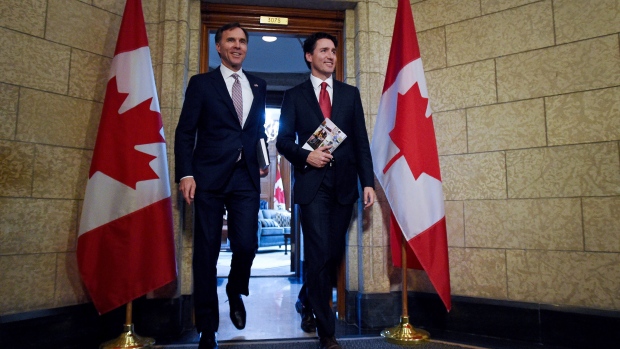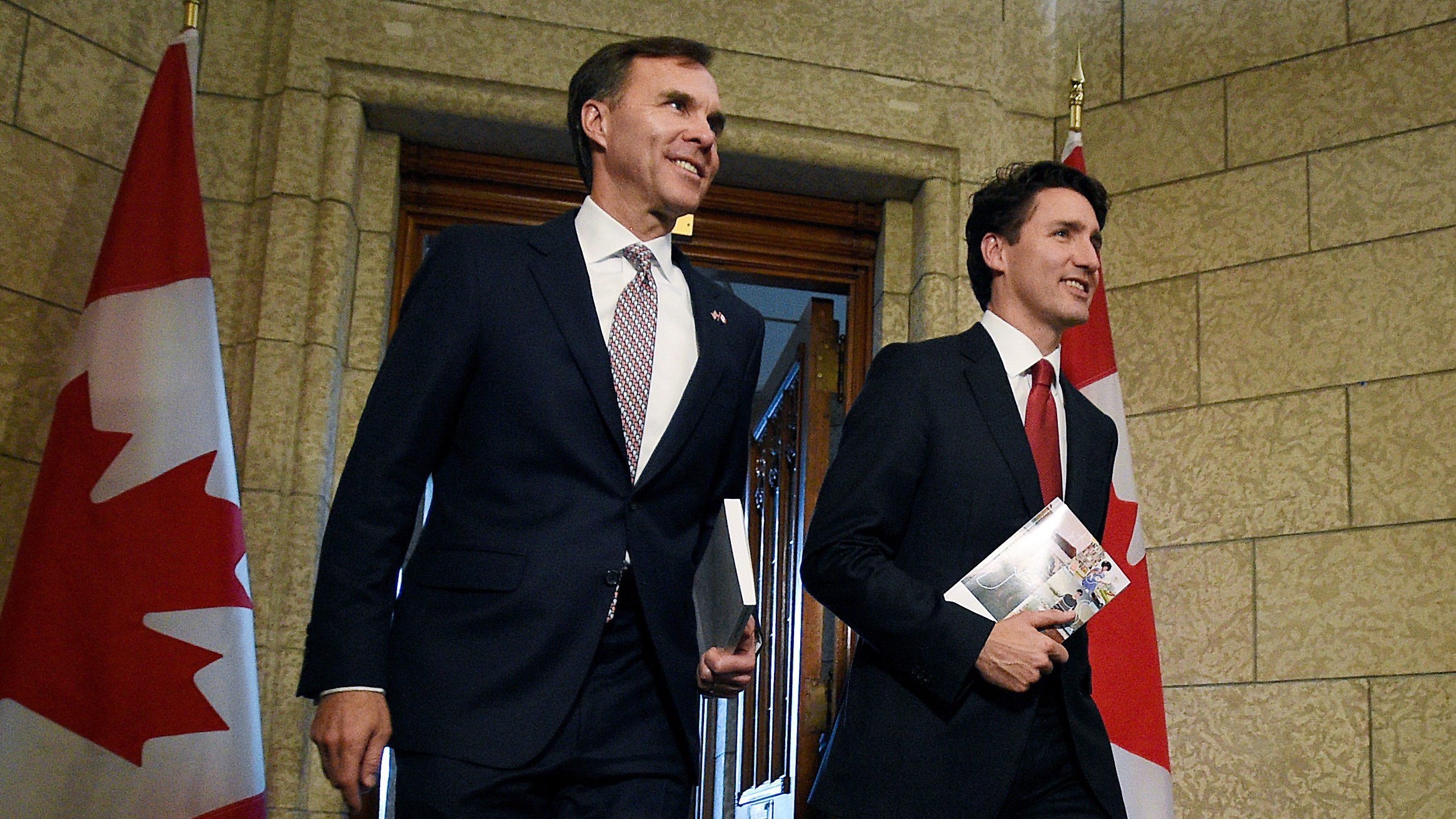Mar 22, 2017
Liberals table ‘placeholder’ budget amid Trump uncertainty
By Greg Bonnell

Ottawa handed in a “placeholder” budget on Wednesday in the face of U.S. President Donald Trump’s uncertain tax policies, staying the economic course despite investor fears about a further turning of the screws on the rich.
While promising new money over the long-term for affordable housing and child care, Finance Minister Bill Morneau heeded Bay Street’s warnings to keep his hands off the treatment of capital gains and dividend income.
The revenue-strapped Liberal government says it will run a $28.5-billion deficit for the coming fiscal year, with no balance in sight over the next five years. This coming year’s deficit includes a fiscal cushion to the tune of $3 billion.
The closely watched debt-to-GDP ratio nudges up one tick to 31.6 per cent this coming year, before falling starting in 2019. Even at that level, it’s the lowest in the OECD.
While not called out by name, Republican policy under the Trump presidency is the elephant in the room with Budget 2017.
When asked if fiscal plans are effectively on hold as Ottawa awaits clarity south of the border, Morneau would only say the Liberals “will continue to deal with global challenges as we face them.”
That $3-billion adjustment for risk is an idea several economists had floated ahead of the budget as Washington debates personal and corporate tax cuts, and a potential border adjustment tax that could hit Canada’s economy.
Given that uncertainty, the Liberal fiscal plan amounts to a “placeholder,” according to Manulife Financial Senior Economist Frances Donald.
“You can’t make tax change policy without knowing what the U.S. tax policy is going to be, and you won’t get that before this summer,” Donald said, adding the Liberals are pretty much forced to stay the course.
“Why change your strategy in the first inning of the baseball game?”
That’s not to say the $330-billion spending plan doesn’t contain some interesting nuggets – including a tax measure to ensure Uber and other ride-sharing services are captured by the same GST and HST rules as taxis.
And excise duty rates on booze are going up two per cent starting Thursday. That means you’ll be paying roughly five more cents for a 2-4 of beer, seven cents more for a 750ml bottle of spirits, and a penny more for a bottle of wine.
As more and more Canadians find themselves priced out of the country’s housing market, Morneau is pledging $11.2 billion over 11 years to support a National Housing Strategy. That includes:
- $5 billion for a national housing fund administered by Canada Mortgage and Housing Corporation, focused on large-scale community renewals, building new affordable housing, and supporting affordable rentals.
- $3.2 billion for provinces and territories to support affordable housing
- $2.1 billion to target homelessness
- $241 million for CMHC to improve data collection
When it comes to foreign investors and property flippers; the budget contains no new measures to dissuade those who some say have become problematic players in the housing market. There is, however, almost $40 million over five years to build what amounts to property database that would track, among other things, foreign ownership.
The budget also sets aside an additional $7 billion over 10 years for affordable daycare, with a pledge to create 40,000 new subsidized child care spaces over the next three years.
And as the Liberals champion an innovation agenda, skills training will get an additional $2.7 billion over six years.
While all those numbers sound substantial, so is the timeline for making those investments.
The budget shows that over six years starting in 2016-17, the costs of all government policy actions since last year and investments in this budget total just $5.7 billion.
As for putting more details about the much touted Infrastructure Bank, the budget says the government will “soon propose” legislation to establish the bank and have it up and running by the end of this year.
The aim is to invest $35 billion in public funds to attract $140 billion in private investment capital.
Scant details in the budget and the lack of progress to date suggests getting the bank up and running by the end of the year is “very optimistic,” according to Ian Russell of the Investment Industry Association of Canada.
“That means it’s going to be at least several years before the federal government will be able to attract private equity capital to infrastructure,” said Russell. “And that means infrastructure won’t have much impact on the economy over the next several years.”
WEIGH IN

Does the new federal budget make you more or less confident about the Canadian economy?
In fact, the budget scales back expectations for economic growth this year – to 1.9 per cent real GDP for 2017, down from 2.1 per cent in the fall economic statement.
That number, however, is based on private sector forecasts gathered earlier this year. Since then, key sectors of the economy – including manufacturing and retail – have come on strong.
As for oil prices, the budget forecasts an average price of US$54 for West Texas Intermediate for 2017. Oil isn’t forecast to break above US$60 a barrel until 2021.
And while the budget didn’t touch tax treatment of capital gains and dividend income, it did fire a warning shot at high-income earners using tax planning strategies involving private corporations as a means to pay lower personal tax: That tax structure is under review, and the government will release a paper on it in the coming months.
The Liberals are also talking tough on tax collection, saying Ottawa will recover an additional $2.5 billion over five years by cracking down on tax avoidance.
And for Canadians who use public transit for their daily commute, the Liberals are killing the public transit tax credit effective June 30. The Harper-era tax credit has failed to either increase transit use or reduce greenhouse gas emissions, according to the budget.


